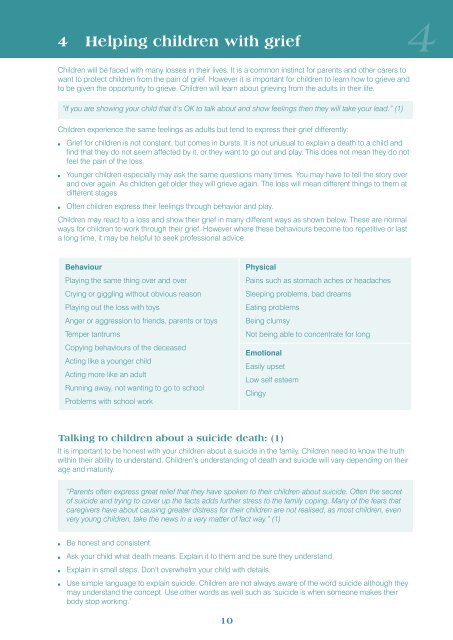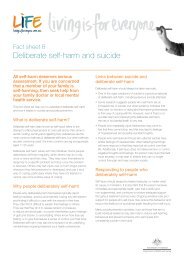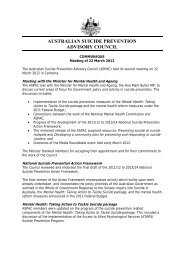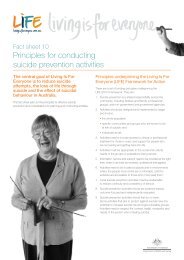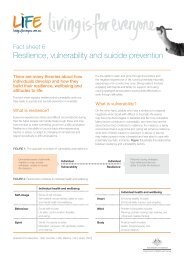Information & Support pack WA - Living is for Everyone
Information & Support pack WA - Living is for Everyone
Information & Support pack WA - Living is for Everyone
- No tags were found...
You also want an ePaper? Increase the reach of your titles
YUMPU automatically turns print PDFs into web optimized ePapers that Google loves.
4 Helping children with grief4Children will be faced with many losses in their lives. It <strong>is</strong> a common instinct <strong>for</strong> parents and other carers towant to protect children from the pain of grief. However it <strong>is</strong> important <strong>for</strong> children to learn how to grieve andto be given the opportunity to grieve. Children will learn about grieving from the adults in their life.“If you are showing your child that it’s OK to talk about and show feelings then they will take your lead.” (1)Children experience the same feelings as adults but tend to express their grief differently:■■■■■■Grief <strong>for</strong> children <strong>is</strong> not constant, but comes in bursts. It <strong>is</strong> not unusual to explain a death to a child andfind that they do not seem affected by it, or they want to go out and play. Th<strong>is</strong> does not mean they do notfeel the pain of the loss.Younger children especially may ask the same questions many times. You may have to tell the story overand over again. As children get older they will grieve again. The loss will mean different things to them atdifferent stages.Often children express their feelings through behavior and play.Children may react to a loss and show their grief in many different ways as shown below. These are normalways <strong>for</strong> children to work through their grief. However where these behaviours become too repetitive or lasta long time, it may be helpful to seek professional advice.BehaviourPlaying the same thing over and overCrying or giggling without obvious reasonPlaying out the loss with toysAnger or aggression to friends, parents or toysTemper tantrumsCopying behaviours of the deceasedActing like a younger childActing more like an adultRunning away, not wanting to go to schoolProblems with school workPhysicalPains such as stomach aches or headachesSleeping problems, bad dreamsEating problemsBeing clumsyNot being able to concentrate <strong>for</strong> longEmotionalEasily upsetLow self esteemClingyTalking to children about a suicide death: (1)It <strong>is</strong> important to be honest with your children about a suicide in the family. Children need to know the truthwithin their ability to understand. Children’s understanding of death and suicide will vary depending on theirage and maturity.“Parents often express great relief that they have spoken to their children about suicide. Often the secretof suicide and trying to cover up the facts adds further stress to the family coping. Many of the fears thatcaregivers have about causing greater d<strong>is</strong>tress <strong>for</strong> their children are not real<strong>is</strong>ed, as most children, evenvery young children, take the news in a very matter of fact way.” (1)■■■■■■■■Be honest and cons<strong>is</strong>tent.Ask your child what death means. Explain it to them and be sure they understand.Explain in small steps. Don’t overwhelm your child with details.Use simple language to explain suicide. Children are not always aware of the word suicide although theymay understand the concept. Use other words as well such as ‘suicide <strong>is</strong> when someone makes theirbody stop working.’10


